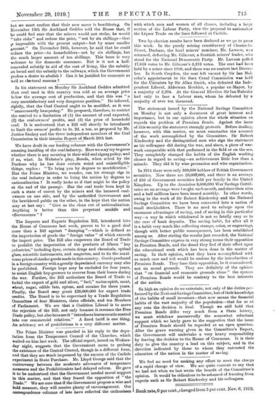The Imports and Exports Regulation Bill, introduced into the House
of Commons last week, proves to be a good deal more than a Bill against " dumping "—which is defined as the importation of goods the " foreign value " of which exceeds the import price. The Bill also empowers the Board of Trade to prohibit the importation of the products of fifteen " key industries," including dyed, certain drugs and chemicals, optical glass, scientific instruments, and magnetos, and to fix the maxi- mum prices of similar goods made in this country. Goods produced In a foreign country with a greatly depreciated currency may also be prohibited. Foreign hops may be excluded for four years, to assist English hop-growers to recover from theii losses during the war. Further, the Bill authorizes the Board of Trade to forbid the export of gold and silver, " fuel," motor-spirit, meat, wheat, sugar, edible fats, opium, and cocaine for three years. Many, the Board nay grant £26,000,000 for export trade credits. The Board is to be supervised by a Trade Regulation Committee of four Ministers, three offioials, and ten Members of Parliament. We see that a Coalition Liberal is to move the rejection of the Bill, not only because it reverses the Free Trade policy, but also because it " introduces bureaucratic control into our commercial relations." A fixed tariff is one thing. An arbitrary set of prohibitions is a very different matter.










































 Previous page
Previous page